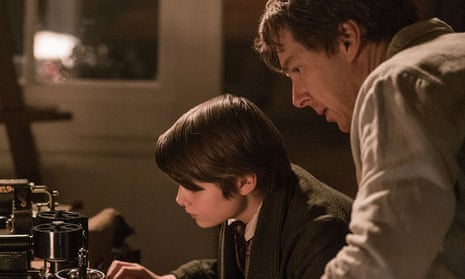This title has a pun which is probably too weirdly pedantic even to count as groanworthy: an immediate, contemporary war being fought on the issue of electrical current. Director Alfonso Gomez-Rejon, who has worked in TV and as second-unit to film-makers like Alejandro G Iñárritu, before making the 2015 feature Me and Earl and the Dying Girl, has now re-imagined the late 19th-century battle between electricity pioneers Thomas Edison and George Westinghouse to establish their own dominant electrical system. A comparable movie could yet be made about the battle between Beta and VHS.
In the 1880s, Thomas Edison astonishes the world by illuminating a section of Manhattan at night using his new-fangled electrical light – and Westinghouse, whose business had until that moment been based on gas, resolves to challenge him with a different system. Edison favoured direct current and Westinghouse alternating current, and it was a titanic war of personalities and ideas, which incidentally involved a gruesome minor battle, which this film tactfully passes over: Edison tried to get the rival AC approach identified (and stigmatised) in the public mind with the death penalty and the electric chair, whose frazzling executions were macabre and often bungled.
At any rate, Gomez-Rejon’s film is not about that; it is high-minded and poised and interestingly it does not offer the obvious notion that Edison and Westinghouse were as different as chalk and cheese. Rather the reverse: their contest was all the more dramatic because they actually had a good deal in common, for all that Edison was the more unconventional of the two. It is more like a strategic confrontation between rival generals or statesmen. Westinghouse is shown hoping for a compromise, in which they might yet divvy up America’s energy market between them, being responsible for production and distribution. But Edison is not receptive to this approach.
Michael Shannon is cast a little against type as Westinghouse: a mutton-chop whiskered gentleman, to be seen here at a grand dinner, like a figure in Edith Wharton or Henry James. His wife Marguerite, played beautifully by Katherine Waterston – making the most of a supporting role – is resplendent with the social cachet that goes with being the wife of a captain of industry. Benedict Cumberbatch’s Ediston is more mercurial, more bullish, less established. He is insistent that he will never take money from munitions or the dealers of war and death, and is in fact reliant on an exasperated patron: JP Morgan, nicely played by Matthew Macfadyen. Tuppence Middleton plays his wife Mary, far less of a grande dame than Marguerite.
The real wild card is the legendary genius and scientific maverick Nikola Tesla, played here straightforwardly by Nicholas Hoult – and without much of the obvious rock-star allure that he had when he was played by David Bowie in Christopher Nolan’s 2006 movie The Prestige. This film is not offering the traditional opposition of Tesla the inspired master versus the boring stuffed shirts of what might be called MSS: mainstream science. Here it is Westinghouse and Edison who are important, with Tesla being co-opted finally onto Westinghouse’s team.
This a watchably stylised period film, with interesting visual setpieces and faces looming up at us out of intricately contrived backgrounds. Gomez-Rejon’s style reminded me a little of Paolo Sorrentino at times, striving for something mythic or operatic. The performances from Cumberbatch and Shannon are workmanlike and serviceable, but with perhaps fewer sparks flying than they usually get from their roles. Overall, the voltage isn’t as high it might have been.

Comments (…)
Sign in or create your Guardian account to join the discussion